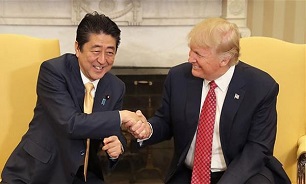US Approves $133mln Interceptor Missile Sale to Japan Amid Breakthrough Intra-Korean Talks
 The US State Department announced on Tuesday it had given preliminary approval for Japan to purchase four SM-3 Block 2A missiles manufactured by Raytheon Co and BAE Systems, related hardware equipment, and technological, engineering and logistics services provided by the US government and contractors, as the deal will cost Tokyo at least $133.3 million, according to US State Department estimates, RT reported.
The US State Department announced on Tuesday it had given preliminary approval for Japan to purchase four SM-3 Block 2A missiles manufactured by Raytheon Co and BAE Systems, related hardware equipment, and technological, engineering and logistics services provided by the US government and contractors, as the deal will cost Tokyo at least $133.3 million, according to US State Department estimates, RT reported.
“This proposed sale will contribute to the foreign policy and national security of the United States by improving the security of a major ally” by providing it “with an increased ballistic missile defense capability to assist in defending the Japanese homeland and US personnel stationed there,” it said in a statement.
The deal falls in line with the policy of US President Donald Trump’s administration of reassuring its allies in the region “threatened by the DPRK’s provocative behavior,” a State Department official added.
Last month, the Japanese government approved the purchase and deployment of two Aegis Ashore batteries at the cost of some $2 billion, including infrastructure, with each unit of the system accounting for at least $888 million. The system is expected to be put into operation by 2023. The planned military build-up required the Japan’s Defense Ministry to seek a record-high $48 billion military budget for the next fiscal year starting April.
Representatives from North and South Koreas began direct talks on Tuesday, in the first instance of face-to-face dialog in more than two years, as the fresh talks were being held behind closed doors at the Peace House in the Joint Security Area in the truce village of Panmunjom, at the demilitarized zone (DMZ) between the divided countries.
In a joint statement issued at the end of the meeting, Pyongyang made a “strong complaint” after Seoul proposed negotiations to denuclearize the Korean Peninsula.
Pyongyang has also announced that it has plans to send a delegation to the Winter Olympics in the South Korean city of Pyeongchang to cheer on the team. North Korea has also proposed to send groups of fans, musicians, taekwondo demonstration teams and journalists to Pyeongchang.
North and South Korea have also agreed to reopen their military hotline on Tuesday, as normal communications between the two Koreas, via the hotline, are expected to resume on Wednesday.
Pyongyang had stressed that the intra-Korean talks are a “great opportunity” for unification, but warned foreign parties against compromising the talks, state-run KCNA news agency reported, commenting on a speech by North Korean leader.
As Russia and China welcomed an agreement by North and South Koreas to resume dialog, US Envoy to the United Nations Nikki Haley warned in a statement that Washington would not recognize any talks between the two Koreas unless the nuclear issue will be resolved and all of their nuclear weapons banned.
"North Korea can talk to anyone they want, but the United States is not going to recognize it or acknowledge it until they agree to ban the nuclear weapons that they have," Haley said.
US decades-long military presence in and around the Korean Peninsula has forced Pyongyang to develop its ballistic missiles and nuclear weapons as a deterrent against Washington's aggression. The United States has thousands of troops in the region, partially in South Korea and Japan, and routinely threatens the North with military action to stop its weapons program.
Pyongyang has firmly defended its military program as a deterrent against the hostile policies of the US and its regional allies, including South Korea and Japan. North Korean officials have time and again accused their American counterparts of seeking regime change in their country.
